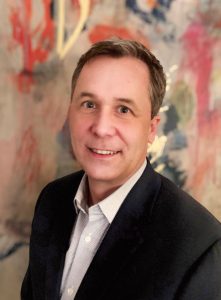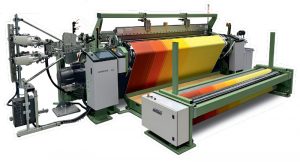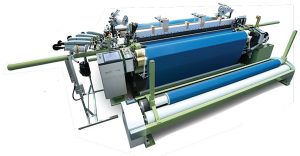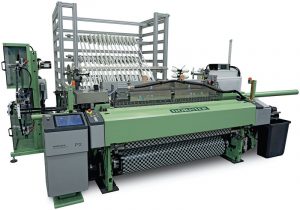
American DORNIER’s Oliver Meier shares his thoughts on his experience as a textile executive and the weaving machine industry as he enters his second year at the helm of the company.
TW Special Report
Oliver Meier became the executive vice president at the helm of Charlotte, N.C.-based American DORNIER, a subsidiary of Germany-based Lindauer DORNIER GmbH, just over a year ago. The company staged a symbolic display of the change in management at its Technology Day 2023 where Meier and Peter Brust —the previous head of American DORNIER for 22 years who had retired — conducted a yarn transfer from a left-hand to a right-hand rapier (See “American Dornier: Focus On Leadership, Technology And Training,” TW, November/December 2023).
DORNIER began life in aircraft design and construction before transitioning in the 1950s to textile equipment. Today, the company’s technologies include rapier and air-jet weaving machines; film stretching lines for biaxial polypropylene and polyester films; and the DORNIER Composite Systems®, which comprises the PROTOS® TP for unidirectional tapes, PROTOS TW for woven tape fabrics and TRITOS® for multilayer and 3D fabrics. From its Charlotte location, American DORNIER serves the Americas with sales and support, spare parts, installation, service and personnel training, film stretching clip chain overhaul and repair, and marketing.
Textile World recently had the opportunity to chat with Meier about his first year with the company, his experience as a textile executive and the outlook for the company.
TW: Shifting into your second year as executive vice president of American DORNIER, how was the transition and how do you perceive DORNIER’s role in an ever-evolving U.S. textile industry?
Meier: My first year with American DORNIER has been excellent. The transition has been very smooth thanks to our exceptional team that has great technical knowledge and experience in our field, and which has been very supportive of my new role.
One of the key aspects I’ve focused on during my first year at American DORNIER is preserving its historical role of more than 45 years and its current position within the U.S. textile industry. DORNIER has a rich heritage of innovation and quality in textile machinery, exemplified by our latest P2 rapier weaving machine and our new A2 air-jet weaving machine. My focus is to ensure that we keep building on this foundation to remain relevant in an ever-evolving marketplace.
We recently completed a successful restructuring of our strong sales and service team, adding additional team members to better position us for future changes in the industry. Support, from customer service and OEM parts on demand to technical assistance, will play an even more important role in the future. Our Charlotte facility is well positioned to provide the support our customers in the Americas have come to expect.

TW: As a textile industry veteran whose career has always centered on leading edge technology, how does your past experience inform your new role?
Meier: I never thought of myself as a veteran, but after 28-plus years in the U.S. textile industry, I have gained an understanding of the unique challenges, market trends and volatility, and customer expectations. This greatly supports the business goals and strategic vision we have defined for DORNIER globally.
In essence, my past experience in the textile industry serves as a solid foundation for embracing new challenges in roles focused on leading-edge technology such as that manufactured by DORNIER. It not only informs my decision-making, but also inspires me to push boundaries, driving meaningful innovation and sustainable growth.
TW: Has your variety of experiences in the textile field affected and/or aided your relationships with suppliers and customers in your current position?
Meier: I started my career in automotive textile manufacturing; from there, I moved to software development for the textile industry, which introduced me to the era of Industry 3.0. This helped prepare me to find new opportunities in the textile machinery industry. Overall, my varied experience has enhanced my ability to better manage successful business relationships with customers, suppliers and within DORNIER.
TW: What makes DORNIER unique in the weaving sector and what are the company’s greatest strengths?
Meier: Known by many as the “Green Machine,” DORNIER’s weaving machines are a unique combination of flexibility, durability and robustness. It is not without reason that we say “Anything that can be wound onto a yarn spool can be processed on a weaving machine from DORNIER.”
Next year, DORNIER will be able to look back on 75 years of innovation in the weaving industry. I believe many of Textile World’s readers know that our roots are in the aviation industry. Mr. Peter Dornier founded Lindauer DORNIER in 1950, manufacturing shuttle looms, which evolved into positive rapier weaving machines in the late 1960s — known today as the P2 — and in the late 1980s the air-jet weaving machine — known today as the A2 —joined our portfolio.
Our weaving machines are “Made in Germany,” 100-percent designed and manufactured to this day in Lindau, Bavaria. We support our customers worldwide through several subsidiaries such as American DORNIER in Charlotte, founded in 1978.
Quick access to service personnel and spare parts for our customers is a crucial backbone of our business. Another strong focus for DORNIER is technical textiles, an important and growing sector of the textile industry worldwide, but especially in the United States. The precision, versatility and maximum production reliability of DORNIER weaving machines lend themselves greatly to the development and production of technical textiles. So much so, that 10 years ago the company decided to create a separate division called Composite Systems. It focuses exclusively on the development and production of composite weaving machines for the growing demand in this market sector. To support this market, you have to be able to manage, manufacture, and support one-of-a-kind weaving systems with individual, unique features that you may not find anywhere else.
I consider these to be some of DORNIER’s major strengths, which we use in all three of our business sectors: weaving, film stretching and composite systems.
TW: Has the U.S. market for new weaving and composites machinery improved or changed with the industry’s pivot to high-value technical textiles?

Meier: Yes, absolutely. The demand for technical textiles is increasing every year driven by applications in aerospace, automotive, filtration, and protective applications, to name just a few applications. Composite materials, especially woven composites, are one of the few textile market sectors in North America with significant growth expectations for years to come. As this increasing demand brings scalable composite production more into focus, DORNIER is well positioned to meet the growing need for economical mass production of fiber composite solutions in various industries. With its customized machines and systems for the production of fiber composite components, 3D fabrics and fiber tapes, DORNIER is ready to meet future market demands.
TW: As a leading company in the weaving sector, what developments are key to the future of DORNIER’s business?
Meier: Embracing digitization and automation in the weaving process is essential. This includes IoT-enabled machines, real-time data and predictive analytics, and connectivity to optimize production efficiency to reduce downtime and improve quality.
This is why we are continuously working to increase the level of digitization of our weaving machines, for example, to better track machine, fabric and weft data, as seen most recently with the A2 air-jet weaving machine.
Another future development for DORNIER in a constantly transforming industry is to ensure reliable and flexible fabric production for our customers even in challenging times.
TW: Are there any factors that concern you with regards to successfully maintaining and growing American DORNIER’s future?
Meier: The landscape for finding and retaining skilled labor has changed dramatically in recent years, especially in the service sector. A weaving machine does not service or repair itself —at least not yet! Hiring and retaining young and qualified employees is very challenging. To counter this and to attract new talent, we offer a variety of programs like our apprentice program and a dual training system in Germany.
Market competition and technological advances are a constant challenge, but not an impediment to growth. Other areas of concern are economic developments and regulatory changes, which can have a serious impact on our business as a foreign subsidiary.
However, as long as we have a direction of where we want to be in the future, challenges are there to be overcome.

TW: As someone with an inherent international perspective — as a German national and
U.S. permanent resident— what is your perception of the current economic climate in the United States during this election year?
Meier: We like to say that in an election year, investment suffers and is often postponed until after the election. The aftermath of the pandemic, where companies invested heavily in new equipment, has a much greater lingering impact than the current election year concerns, in my opinion.
I am more concerned about high interest rates, fueled by continuing inflation, and the negative impact this has on overall economic growth and the housing market, which has a huge impact on the U.S. interior and exterior textile market.
TW: Any thoughts on the investment outlook both from a domestic and international perspective?
Meier: The year 2024 appears to be flat for new investment in our business sector for the Americas. However, early indicators for 2025 and 2026 are promising and show renewed interest in upgrading aging equipment in North America. A very important topic for us, the durability and serviceability of our machines are key factors. Some of our customers in the Americas are using DORNIER weaving machines that are 40 years old or older. Servicing these models with original spare parts is a central pillar for our family-owned company.
South America, on the other hand, will remain a challenge for some time. Ongoing high inflation in Argentina and the devaluation of the Brazilian real against the US dollar are significantly dampening investments in new equipment. These challenges are not new to us and we are well prepared to work with our South American customers to find ways to overcome these short-lived obstacles and to keep providing on-demand service and support.
2024 Quarterly Volume III




